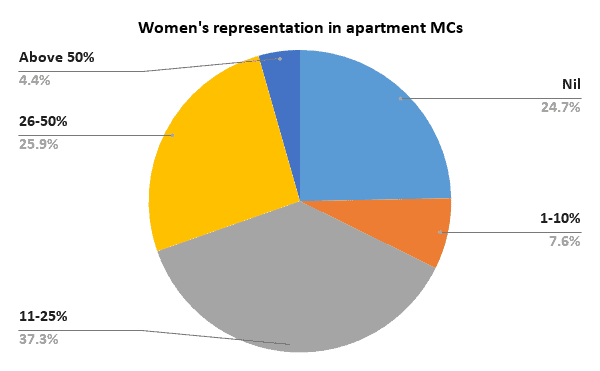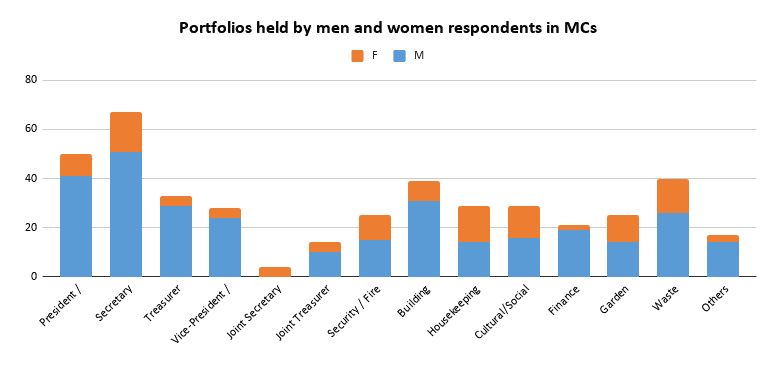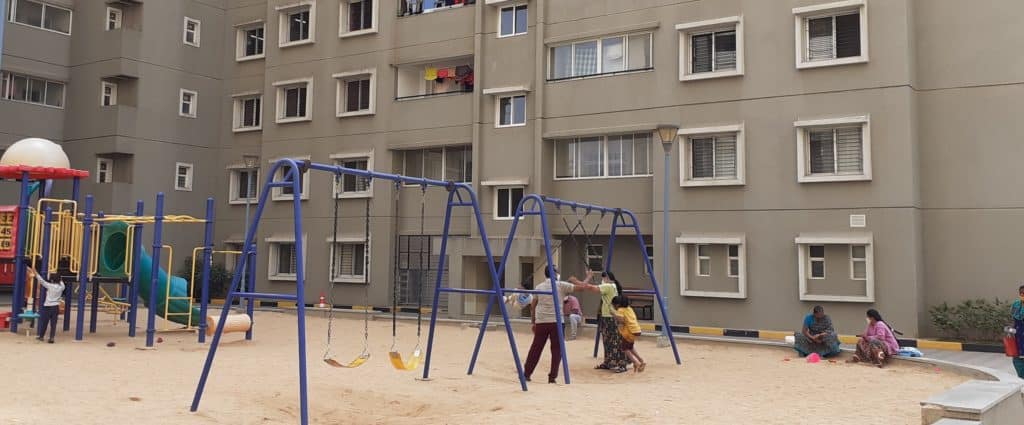We often discuss the poor representation of women in our Legislative Assemblies and the Parliament. Currently, only 3% of members in the State Legislature are women. And while half the seats in the Bruhat Bengaluru Mahanagara Palike Council are reserved for women, in many cases these councillors’ husbands are the ones attending to ward-level issues or even ward committee meetings.
What about in much smaller units of society? Say, in residential apartments in Bengaluru. Do women in these complexes have enough voice and representation in their Managing Committees (MCs)? Apparently, not. MCs have significant responsibilities – they manage common resources and facilities like water, electricity and common areas, and have to ensure judicious spending of the money collected from residents for operational and capital expenses.
When the BBMP allowed domestic workers to return to work in apartment complexes during COVID unlock last year, many women residents complained that their male-dominated MCs were unwilling to let the workers in. Low representation of women in MCs implies not just a power imbalance, but also that issues which more likely affect women get marginalised.
In December 2020 and January 2021, Citizen Matters conducted a survey among apartment MC members across Bengaluru, and the results show that women still have a long way to go in getting equal representation in MCs. Overall, 158 people – 123 men and 35 women – who have ever been a member of their apartment MC, participated in the survey. Among both men and women, the majority of respondents were in the age group of 40-49 years.
49% respondents’ MCs had no woman office bearer
Among the respondents, 49% said there were no women office bearers at all in their apartments MCs currently. Office bearer here includes the key posts of president, vice president, secretary, joint secretary, treasurer and joint treasurer.
As many as 80% of the respondents said their MC had a male president, 82% had a male treasurer, 77% had a male secretary in the MC, and 73% had a male vice-president. Only in the designations of joint secretary and joint treasurer were the proportion of men lower than 50%. But this wasn’t because more women occupied those positions, but because these two designations did not exist in many MCs. The proportion of women office-bearers was highest for the position of ‘secretary’, but this was a meagre 22%.
When considering any position held by women in MCs (not just office-bearer posts, but also other positions like being in charge of security, housekeeping, etc.), their representation improved. However, 25% respondents said there were no women members in their MCs in this scenario too. Only a minuscule 4% had MCs with women occupying more than half the positions.

In general, a majority of respondents (68%) said regular nominations and elections were held to their MCs as per the bye-laws governing apartment associations. However, an almost equal percentage said not enough people were coming forward to join the MC. Over a quarter of all respondents also felt that decisions were taken by only a few people in the MC.
Most women MC members oversee housekeeping, waste management
We also asked survey participants about the positions they themselves have held in the MCs up till now (including office bearer and other posts). When it came to women respondents, a majority (46%) said they had held the position of secretary.
However, the next most common portfolios for women were, being in charge of housekeeping (43%), waste management (40%) and cultural/social activities (37%) – all traditionally considered women’s work. In contrast, only 23% women had been in charge of building maintenance/infrastructure, and only 6% in charge of finance – both considered more heavyweight portfolios.
Among male respondents, the most commonly held positions were secretary (41%), president (33%), in-charge of building maintenance/infrastructure (25%), and treasurer (24%).

Women’s family responsibilities don’t leave time for MC, said women respondents
When we asked respondents the possible reasons for women’s underrepresentation in MCs, two reasons were cited most commonly – that women’s responsibilities to their families didn’t leave them time for the MC; and that women were not interested in being in the MC.
However, more men believed women’s lack of interest was the reason – 24% male respondents vs 14% female respondents voted this as the principle reason for women’s underrepresentation. Whereas the majority of women respondents believed the main reason was that household responsibilities didn’t leave time for women – 26% women respondents vs 20% male respondents voted this option.
Interestingly, among respondents, only 65% felt that women’s underrepresentation in MCs was an issue that needs addressing. The remaining 35% – comprising a nearly equal proportion of men and women respondents – believed it wasn’t a problem.

This corresponds with respondents’ perception of whether this problem exists at all in Bengaluru – 32% of all respondents did not believe that women were underrepresented in the city’s apartment MCs.
When respondents were asked if women were ineffective as MC members, 89% of women disagreed, implying they were confident about women’s capabilities. However, only 59% men held the same view. A large proportion of men (28%) held a neutral view while 13% believed women were ineffective.
Proposed solutions: Reservation, encouragement, family support
While some respondents believed that women do not have adequate leadership qualities, some others said women themselves have to take the initiative to participate in MCs. However, many others proposed specific measures to improve women’s participation – most commonly, reservations, creating awareness, creating a conducive environment in the MC, and family members sharing household chores to free up time for women.
Several respondents suggested that apartment bye-laws be modified to reserve a certain number of seats for women in their MCs. Some pointed out that in most apartments, only the owners could become MC members, and if women did not have ownership of their apartment unit, they could not be part of the MC. They recommended changing this rule.
More women respondents suggested that women’s family members should share household responsibilities. A 45-year-old woman respondent said, “Shouldering equal share of family responsibilities by the partner can help encourage a woman to take up more relevant responsibilities.” Some others suggested that virtual meetings and flexibility in attending meetings would help women participate.

Some suggested providing incentives or making participation in MCs mandatory by rotation. A 39-year-old male respondent suggested incentives with respect to maintenance charges as well as recognition by government and civic bodies for women MC members. Another respondent suggested bonuses and gifts to active members.
Many male respondents recommended setting up sub-committees with specific responsibilities, which could be a stepping stone for women to join the MC later. Several men also felt that MC members are often bullied by unruly residents, which discourages women from participating. A male respondent aged 70, said, “A mechanism has to be found to ensure no bullying and no physical or verbal attack or use of unparliamentary language happens, and contact details of female MC members are not abused or misused.”
Many also suggested creating awareness and encouraging women’s participation by removing misconceptions about MC roles through campaigns, and involving women in decision-making in the apartment in general. “Make women understand that it’s not a tough job,” said a 42-year-old woman respondent, a homemaker.
The apartment I live in has an all ladies MC team this year and the developments happening here in a few months itself is enough to break this misconception that women are inefficient in MC roles.